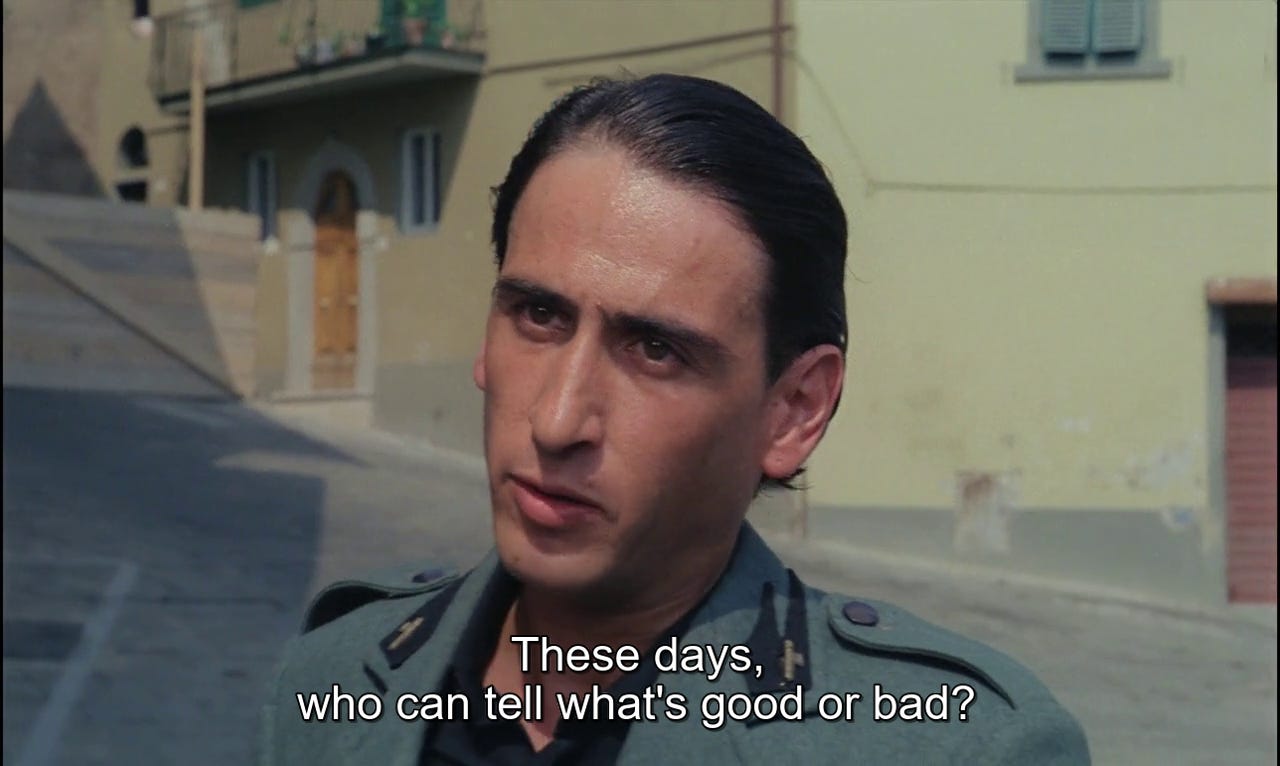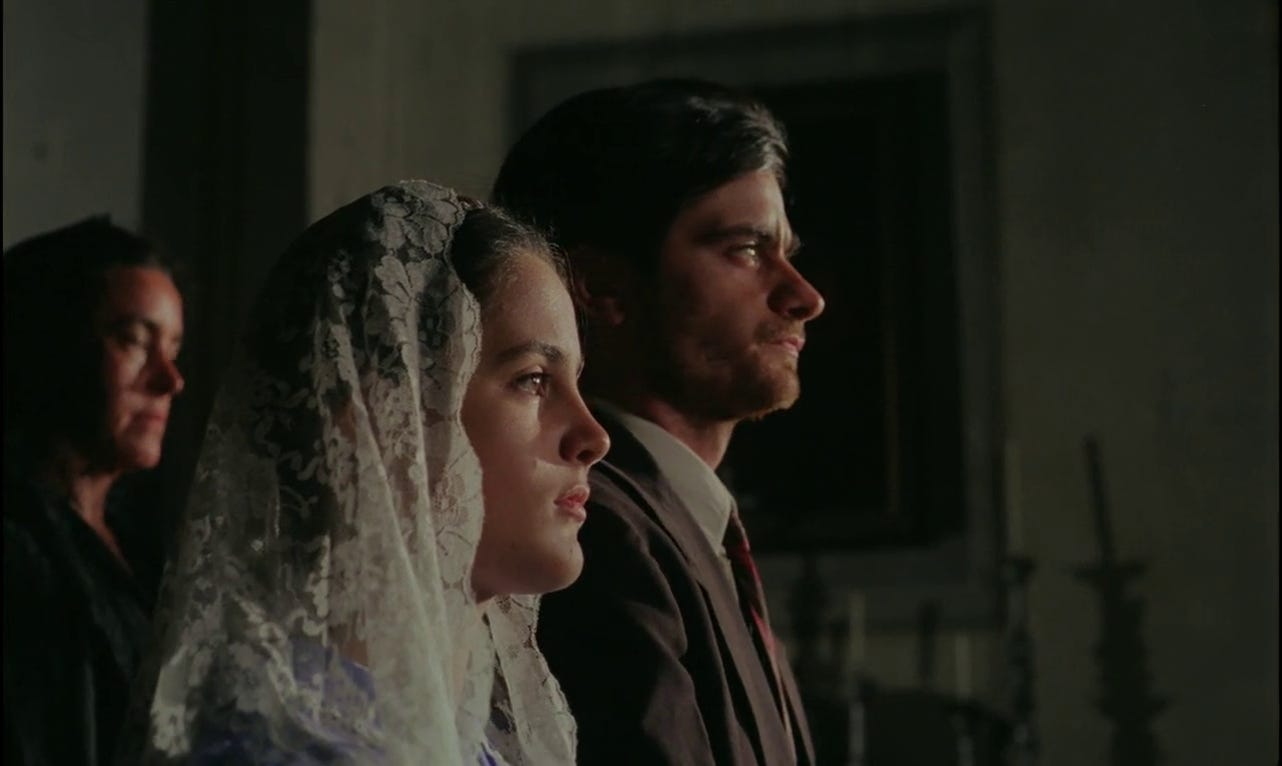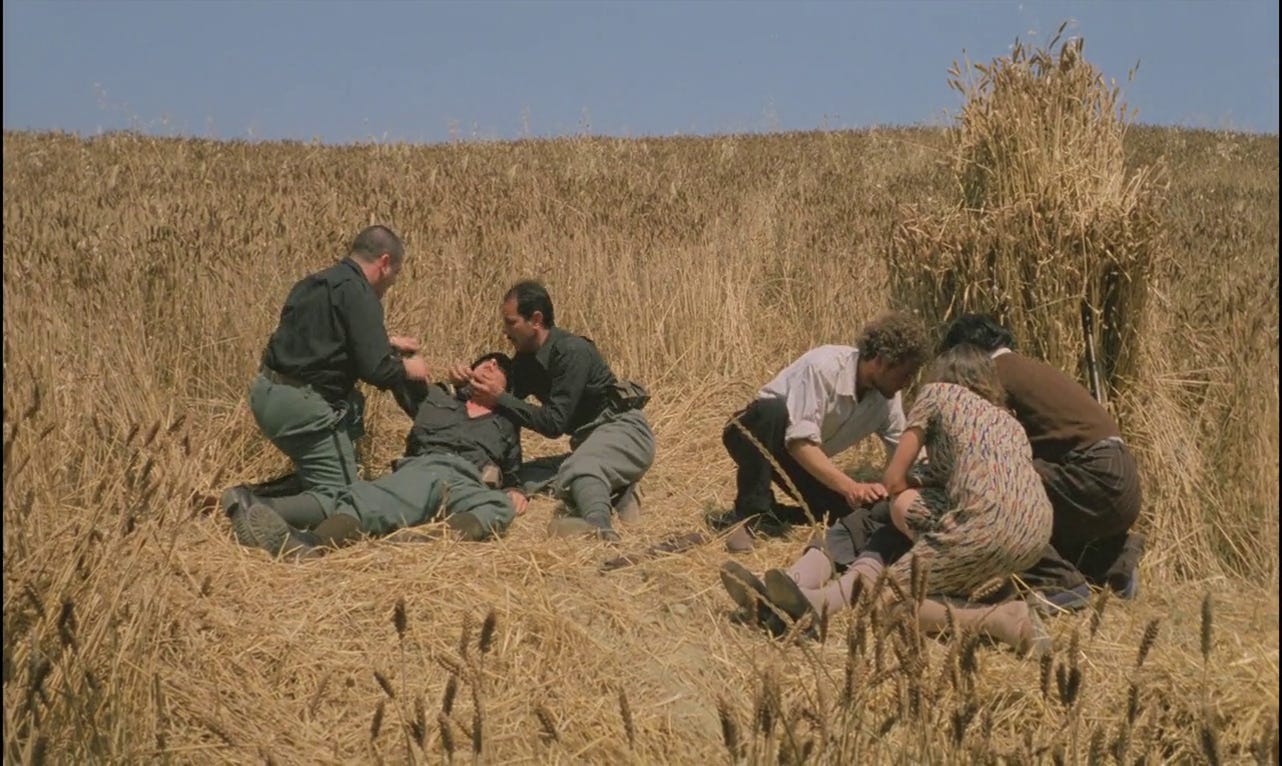Film Review: La Notte di San Lorenzo (Night of the Shooting Stars) 1982, Italian
Ebert said that the movie is too beautiful, and detracts from the story
(Note: I’m rolling out a film review feature where I introduce you to movies that most people in North America are unaware of but that I have rather enjoyed. This will be heavily-tilted towards foreign films. I thank all of you for subscribing to my Substack and this feature is meant for you guys to get more out of the money that you’ve my way.)
There’s a rather brief but highly important exchange twenty minutes into the story where a town elder encounters a young Italian soldier that he recognizes from years ago, having spent some time at his house as a guest of his father’s. The elder, Galvano Galvini, seeks assurances from the young soldier that the retreating Germans won’t dynamite the church in the piazza where the Bishop has asked the townsfolk to gather that night. The soldier, in a state of confusion and mental and physical exhausation, replies to Galvini “These days, who can tell what’s good or bad?”
That one line summaries the Taviani Brothers’ 1982 WW2 fantasy drama La Notte di San Lorenzo (Night of the Shooting Stars).
In our hyper-politicized 21st century where access to information, whether true or false, is only a few keystrokes or touches away, it is often difficult to understand how much communication has changed in even only the past century. Along with this recognition must come one that sees and understands that not all people are fanatically political (until they need to be) and just wish to survive to see the next day/week/year, while being left alone by authorities as much as possible. This holds true for the people of the small Tuscan town of San Martino that we meet in this movie.
As the German forces and their Italian allies withdrew north along the Italian Peninsula, the Americans followed them, liberating village after village, town after town, city after city. Even though communication was relatively weak today (as mentioned above), there was little doubt that the Germans were losing the war. Considered vindictive by the Italians, the residents of San Martino awaited the arrival of American forces as a liberation from 5 long years of warfare and a regime that had lost popularity and legitimacy. Trouble was that a German had been killed in the town only a few days prior, leaving the Wehrmacht concluding that San Martino was a communist redoubt, causing them to mine targeted homes and the piazza with dynamite.
The story begins with a young local man who has deserted from the losing side marries his very pregnant bride in a quick ceremony in the church. The Priest instructs the parishoners that in a type of apocalypse it is their duty to survive. This brings us to the moment highlighted earlier in which the Italian soldier tells Galvano that he cannot tell good from bad these days when asked about whether to trust the Bishop and the Germans that the church will be a safe haven. When you combine these two scenes the townsfolk are left with the direction to survive, but the option of whether to trust the Germans or secretly flee in the night to try and locate approaching American forces. The townsfolk are split on this choice and divide roughly in half between the two options.
I first saw this movie as a teen thanks to the brilliant TV Ontario (public programming) Film International series that would play on Wednesday evenings. This program introduced me to Fellini, Antonioni, Wenders, and other giants, which is why I will always argue in favour of public programming as it is not beholden to the bottom line (and thus, the lowest common denominator), and can experiment and edify, for both good and for bad.
The legendary critic Pauline Kael raved about the film in her review, which went on to win the Jury Special Grand Prix at the Cannes Film Festival in 1982. Roger Ebert though took a different view; he felt that the cinematography was too beautiful and took away from the plot:
It's beautiful film, but it's a disappointment, a series of scenes in which peasants to wartime Italy seem to be posing for heroic post office murals.
and again:
The Tavianis make an additional mistake, which is to make everything so beautiful that it cannot be intensely felt. In one shot, for example, the peasants duck a hail of fascist bullets in a field so sunlit and windswept that the photography, not the bullets, is the real subject.
Ebert’s criticism has validity: the scene that he singles out in particular looks like a Van Gogh painting of wheatfields, where Provence is swapped out with Tuscany. Yet at the same time I think the criticism a bit unfair as there are elements of fantasy in the movie, such as Cecilia’s mind turning the Communist Partisans into Ancient Greeks throwing spears at the Fascist soldier, symbolic impaled by these same wooden spears (fasces). Fantasy is not supposed to conform to reality, so license is to be granted to the Tavianis.
The majority of the townsfolk only want this conflict to end and to keep their heads attached to their own bodies when it does. Caught in the unforgiving whirlwind of history, many do not make it.
Yet there are those who are willingly partisan in the conflict being fought all around them, such as Dante’s band of Communist Partisans that the townsfolk meet along the way, and who exact revenge against a local father-son Fascist pair who ambushes them in a wheatfield.
Elements of class and of age are pervasive throughout the movie. We see how war acts as an accelerant of sorts, fostering teenage crushes, lust in those in their prime, and passion and regret in those who are older. Piovani’s score adds to this by creating a tempo of urgency as the townsfolk pass through the countryside. We also witness the horrific scenes back in San Martino involving the townsfolk that decided to stay. Rather than spoil the story I’ll leave you to it, and hope that you enjoy this great film.
Note: If you have trouble locating a copy of this movie, let me know in the comments below. And please do comment as well. Let me know what you thought of the movie, and what you thought of this review. I’ve never written a movie review before.









I remember it vividly after 41 years, such are the powerful aesthetics of the film. And perhaps that's the point, pace Ebert, that we remember history as series of striking vignettes rather than coherent narratives. FYI: La Notte di San Lorenzo refers to the feast of St. Lawrence, martyred by the Romans by being roasted on a gridiron. His death coincides with the annual Perseid meteor shower, known to tradition as "the Tears of St. Lawrence" -Heaven weeping at his death.
I watched the movie yesterday with a friend of mine and we enjoyed it a lot. It's a beautiful movie. I think we're both tired of depressing looking grey war movies so the fantasy elements and the beautiful photography were welcomed.
You didn't warn us about the 5 minute long make out session between the two old people towards the end, which was both gross and traumatizing.
PLease post more movies. I struggle to find movies to watch that are not shit